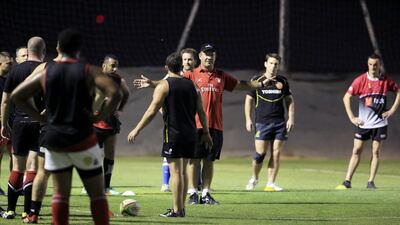Roelof Kotze, UAE rugby’s performance manager, said he believes that no player should ever be guaranteed selection for a representative team, no matter their race or ethnic origin.
The UAE Rugby Federation are in the throes of a long-term plan to increase Emirati participation at all levels of the sport.
For the first time in the continental competition, three Emiratis are in the national team's starting line up for this evening's Asian Five Nations Division 1 fixture against Singapore.
Two more are on the replacements bench.
Kotze, who has vast experience of a transition process in his previous roles within the sport in his native South Africa, was recruited to Emiratise the national team, yet he says he refuses to “sell his soul” just to satisfy a quota.
There were hopes initially that more than five indigenous players would be in the squad.
However, Kotze said he has an obligation to his side to pick the most committed players, regardless of where they come from or their level of experience.
“From the outset I said to the guys, ‘I don’t know you – if you don’t come to my field I cannot pick you and I don’t miss you’,” Kotze said.
“That is a change. I think it seems as if in the past a few guys have thought they can just come to training nearer the time and get picked.
“That has happened – even with the Emirati guys. Through the Shaheen [development programme] system they had the perception that if they just arrive, they will play.
“I have not selected some of them because of it. That is the way it is. You have to be the best.
“There might be pressure to pick some guys, but I am not going to sell my soul just to put them out on the field.
“My loyalty goes to the team first and foremost. You have to be here and you have to do the work if you are going to be in this side.”
Kotze said he believes enforced selection along racial lines can be detrimental to the cause of a player who is over-promoted and does not feel the need to “kill themselves” to improve.
He cited the example of S’bura Sithole, a centre whose development Kotze oversaw while Sithole was playing for Super Rugby team the Sharks in Durban.
The coach recalled Sithole as being “absolutely phenomenal” when he first spotted him as a schoolboy rugby player.
However, his path to a Super rugby contract did not run smooth. He spent three years on the fringes of selection as the coaching staff sought to iron out weaknesses in his game.
Kotze said Sithole is now reaping the benefits of the time he spent sharpening his skills rather than being fast-tracked prematurely.
“Everything he did was working towards playing rugby because he was good enough, not because he is black,” Kotze said.
“Unfortunately what happens with a system that favours people from a certain group, is that you can ignore weaknesses to promote the player. You reach a point where you have to take a step back and realise you have missed a stage in the development by being on the fast-track.
“Once you catch up on those skills you get your chance. That is the message we want to get through to guys.
“Don’t accept that you must play because you are of a certain group, play because you are the best.
“It works.”
The UAE sevens side has been represented exclusively by passport holders since last year, as they seek to challenge at the Asian Games in South Korea in September later this year.
The federation are also hopeful Emiratis can start to make their presence felt in the XVs side, which has traditionally been dominated by experienced expatriate players.
However, the game’s rulers here frequently repeat that they do not want to ostracise expatriate players. Qais Al Dhalai, the federation’s secretary general, said this week they are proud of the union between the different nationalities in the national team.
“We will be proud to, once again, see our expatriate players stand alongside our Emirati players when the anthem is played,” Al Dhalai said.
pradley@thenational.ae
Follow us on Twitter at SprtNationalUAE


